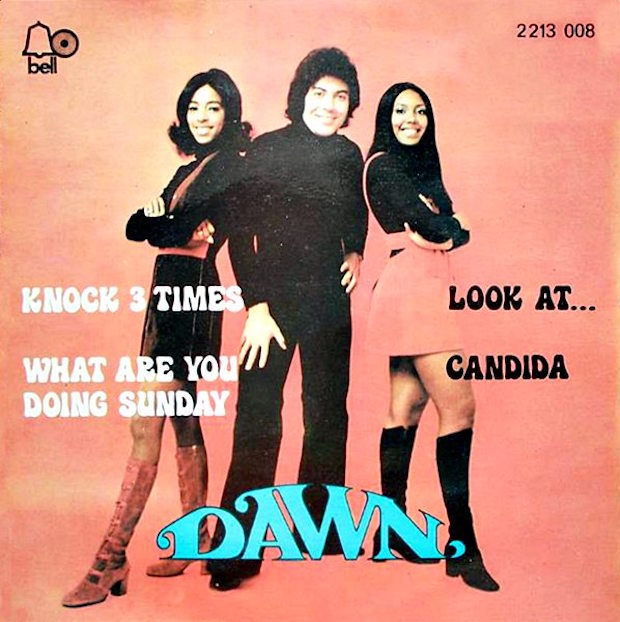In The Number Ones, I'm reviewing every single #1 single in the history of the Billboard Hot 100, starting with the chart's beginning, in 1958, and working my way up into the present.
Tony Orlando & Dawn - "Knock Three Times"
HIT #1: January 23, 1971
STAYED AT #1: 3 weeks
A guy develops an infatuation with the girl who lives in the apartment downstairs. He doesn't know her. Maybe he's never even talked to her. But he decides that he has to do something about it. So he leaves her a note, dangling it on a string outside her window. He tells her to knock on the ceiling three times if she wants to meet him in the hallway. If she doesn't, he says, she should knock twice on the pipe. That's his big idea.
https://youtube.com/watch?v=wT5ms2Nvpco
You probably have questions. I know I do. A goofy pop song is not supposed to leave you considering the logistical implications of a guy's half-baked plan to get laid. What, for instance, does he do if she doesn't answer at all? Is he going to send more notes? What happens if he's not home when she knocks on either the ceiling or the pipe? What happens if she knocks three times on the pipe, or twice on the ceiling? What if she knocks four times? And, more importantly, why doesn't he just talk to her, like a sane person? If he really must send her a note, why doesn't he slide it under her door? Why doesn't he ask her to write a note back? This guy really hasn't thought his plan out very well.
L. Russell Brown, one of the two songwriters behind "Knock Three Times," grew up in a Newark housing project. There was one phone in his building, so when someone in his family got a call, his downstairs neighbors would bang on a radiator -- an annoyance, I'm sure, but at least a workable plan. Brown and his songwriting partner Irwin Levine made that into a song, and they turned it into a horny guy's lament that didn't make any sense at all.
Tony Orlando was another New Jersey guy. He'd started out singing doo-wop as a teenager in the late '50s, and he scored a couple of minor hits in the early '60s. From there, he became a Brill Building songwriter and, eventually, a record executive. He signed Barry Manilow and co-wrote a few songs with him. Orlando didn't really have any plans to become a full-time singer again, but two producers that he knew had recorded a song called "Candida" with a singer named Frankie Paris. Their boss didn't like Paris' vocal, so they got Orlando to come in and overdub it. Orlando couldn't use his name, since he was working for a different label, so he decided to release the song under the pseudonym Dawn. "Candida" was a hit, peaking at #3. (It's a 4.) So Tony Orlando became a singer again, and Dawn became an actual recording outfit.
In an effort to capitalize on the success of "Candida," Orlando and his producer buddies had to slap together an album as quickly as possible, and "Knock Three Times" was part of that effort. It blew up even bigger. Orlando recorded "Knock Three Times" with the backup singers Toni Wine and Linda November, but when Dawn became a touring group, Orlando brought in Telma Hopkins and Joyce Vincent Wilson, two backup singers who'd worked for Motown and Stax and who Orlando had gotten to know from working with Manilow. Dawn eventually became Dawn Featuring Tony Orlando, and then Tony Orlando And Dawn, and that's the version that eventually got a mid-'70s variety show on CBS. Hopkins went on to become a pretty successful TV actress throughout the '80s and '90s; she was, for instance, the Winslow kids' aunt Rachel on Family Matters.
Anyway, "Knock Three Times" fucking sucks. There's a vague Latin lilt to the beat that's nice enough, and there are some nebulously flamenco-y guitars in there that I don't hate, but there's also a whole lot of horn-based orchestral frippery, which serves to make an already-cheesy song even cheesier. The hook -- where the song stops and we hear the sound that's supposed to be someone banging on a ceiling or a pipe -- is memorable, but it's also maddening. Orlando sings it with unctuous lounge-lizard dickishness. If there's anything even vaguely sympathetic about this creep sending his neighbor needily cutesy proto-sexts, Orlando knocks that right out of the song just by dripping smarm all over it.
But there's nothing sympathetic about it anyway! From what I've seen, it never turns out well when apartment neighbors hook up with each other. It's just a bad idea. So here we have a song where a guy uses one bad idea to try to accomplish another. Best case scenario: The girl is bored or lonely enough to go along with it, and then they hook up a few times, and then one of them gets pissed off and jealous when the other one finally gets into a more serious relationship. Worst case: This girl wants nothing to do with him, and now, on top of whatever problems she's already got in her life, she has to deal with the fact that this upstairs neighbor she doesn't know is out here dangling "Wanna fuck?" notes outside her window. In both situations, things are going to get awkward every time these two run into each other in the lobby.
And that's not even getting into how weird it is when Orlando sings, "I can hear your music playing / I can feel her body swaying." How can he feel her body swaying? He can't feel her body swaying. That doesn't even make sense. Shut the fuck up, Tony Orlando.
GRADE: 1/10
BONUS BEATS: Here's the Dead Milkmen rhyming "donuts on your lawn" with "Tony Orlando and Dawn" on their 1985 novelty-punk classic "Bitchin' Camaro":






